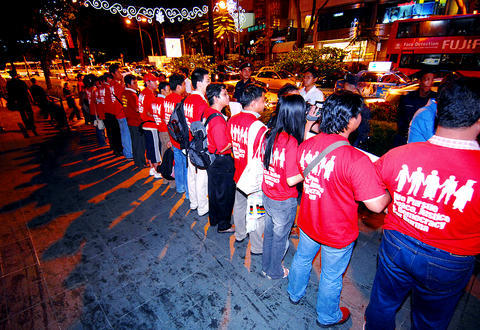A human rights body to be set up by ASEAN should not intervene in human rights issues, but instead protect countries from foreign meddling, according to the contents of a confidential report.
In the report, seen by the Associated Press yesterday, ASEAN diplomats made recommendations for the authority and tasks of the human rights body. The report was commissioned by ASEAN, whose leaders adopted on Tuesday a landmark charter, which among other things calls for creating the human rights agency.
The report's mandate was to list out the agency's powers and duties.

PHOTO: AFP
Its recommendations confirm that the human rights agency would be a toothless body with no power to rein in blatant violators such as Myanmar.
The report's contents reveal the extent of ASEAN's reluctance to hold any of its members accountable -- or to shame them -- for outright human rights violations such as the Myanmar junta's recent crackdown.
The human rights body, to be comprised of representatives from ASEAN countries, should draft a "long-term roadmap" for the promotion of human rights, said the report prepared by a task force led by Singapore.
Such a body should have "respect for national independence, sovereignty, equality, territorial integrity and national identity of all ASEAN member states," it said.
The task force said the human rights body should uphold ASEAN's bedrock policy prohibiting member countries from interfering in one another's domestic affairs -- an edict Myanmar has often invoked to parry criticisms.
The report also says the rights body should oppose attempts by foreign countries to interfere in any ASEAN country's human rights problems.
The agency should "be faithful to ASEAN and its common interests and oppose external influence attempting to interfere in the human rights issues of any ASEAN member state," the task force said.

LONG FLIGHT: The jets would be flown by US pilots, with Taiwanese copilots in the two-seat F-16D variant to help familiarize them with the aircraft, the source said The US is expected to fly 10 Lockheed Martin F-16C/D Block 70/72 jets to Taiwan over the coming months to fulfill a long-awaited order of 66 aircraft, a defense official said yesterday. Word that the first batch of the jets would be delivered soon was welcome news to Taiwan, which has become concerned about delays in the delivery of US arms amid rising military tensions with China. Speaking on condition of anonymity, the official said the initial tranche of the nation’s F-16s are rolling off assembly lines in the US and would be flown under their own power to Taiwan by way

OBJECTS AT SEA: Satellites with synthetic-aperture radar could aid in the detection of small Chinese boats attempting to illegally enter Taiwan, the space agency head said Taiwan aims to send the nation’s first low Earth orbit (LEO) satellite into space in 2027, while the first Formosat-8 and Formosat-9 spacecraft are to be launched in October and 2028 respectively, the National Science and Technology Council said yesterday. The council laid out its space development plan in a report reviewed by members of the legislature’s Education and Culture Committee. Six LEO satellites would be produced in the initial phase, with the first one, the B5G-1A, scheduled to be launched in 2027, the council said in the report. Regarding the second satellite, the B5G-1B, the government plans to work with private contractors

‘NARWHAL’: The indigenous submarine completed its harbor acceptance test recently and is now under heavy guard as it undergoes tests in open waters, a source said The Hai Kun (海鯤), the nation’s first indigenous defense submarine, yesterday began sea trials, sailing out of the Port of Kaohsiung, a military source said. Also known as the “Narwhal,” the vessel departed from CSBC Corp, Taiwan’s (台灣國際造船) shipyard at about 8am, where it had been docked. More than 10 technicians and military personnel were on deck, with several others standing atop the sail. After recently completing its harbor acceptance test, the vessel has started a series of sea-based trials, including tests of its propulsion and navigational systems, while partially surfaced, the source said. The Hai Kun underwent tests in the port from

MISSION: The Indo-Pacific region is ‘the priority theater,’ where the task of deterrence extends across the entire region, including Taiwan, the US Pacific Fleet commander said The US Navy’s “mission of deterrence” in the Indo-Pacific theater applies to Taiwan, Pacific Fleet Commander Admiral Stephen Koehler told the South China Sea Conference on Tuesday. The conference, organized by the Center for Strategic and International Studies (CSIS), is an international platform for senior officials and experts from countries with security interests in the region. “The Pacific Fleet’s mission is to deter aggression across the Western Pacific, together with our allies and partners, and to prevail in combat if necessary, Koehler said in the event’s keynote speech. “That mission of deterrence applies regionwide — including the South China Sea and Taiwan,” he